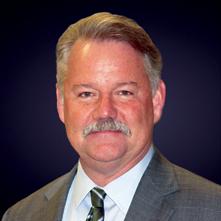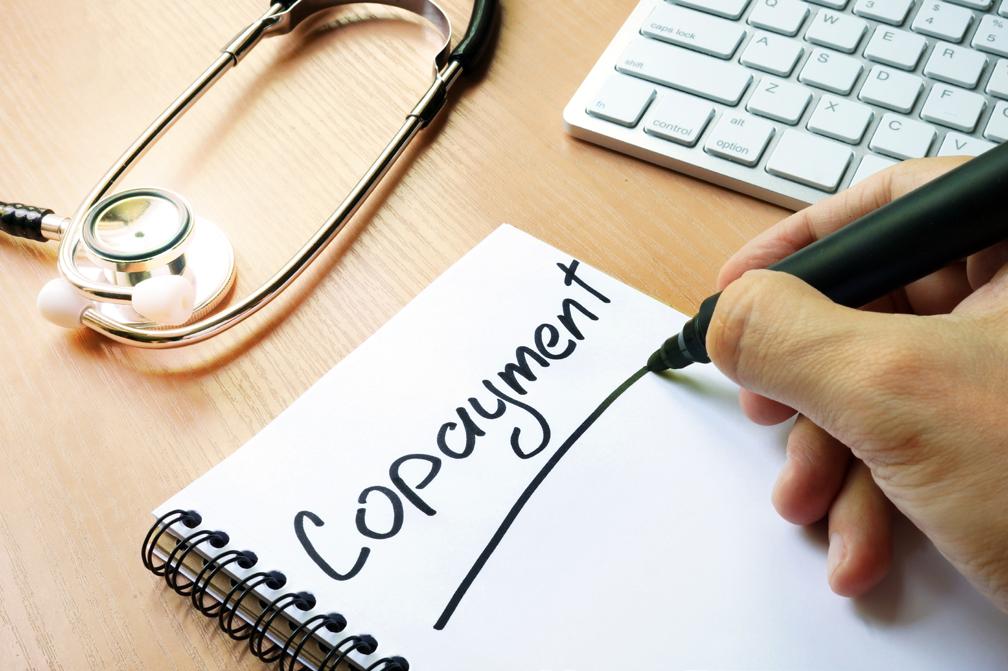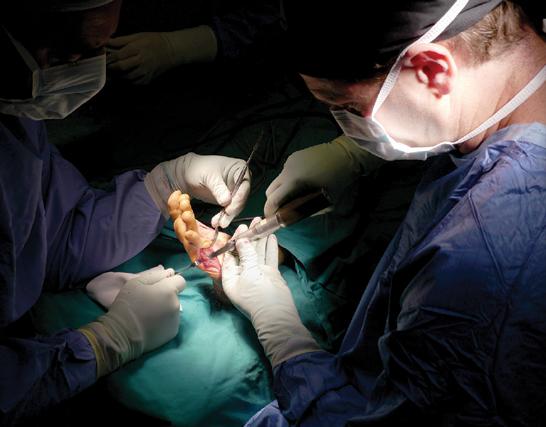
9 minute read
Waived Copayments: No Good Deed Goes Unpunished
Waived Copayments:
NO GOOD DEED GOES UNPUNISHED.

By C. Keith Greer, Esq.
In these tough financial times, Dr. Thoughtful decides to help his community by advertising that the practice will accept insurance payments as payment in full for all professional services. The community appreciates the offer and Dr. Thoughtful’s gift to the community is reciprocated as the practice flourishes. However, Dr. Lostbizness isn’t so happy, and notifies CMS/Medicare of what’s going on down the street. Is Dr. Thoughtful in trouble? Short answer: yes. Dr. Thoughtful’s kind gesture is problematic because routine waiver of deductibles and copayments violates the federal Anti-Kickback Statute. Moreover, because it results in Medicare paying more than it should, it also violates the False Claims Act. Penalties include repayment demands, treble damages, civil monetary penalties, and potential imprisonment. Under these laws, copayment waiver occurs whenever a health care provider is paid by an insurer but chooses not to collect a copayment. This includes: billing but not collecting a copayment; writing-off copayment amounts; and routine use of “financial hardship” forms which state that the beneficiary is unable to pay the coinsurance/deductible (i.e., there is no good faith attempt to determine the beneficiary’s actual financial condition). Although it is not illegal to write off a patient’s copay balance, in order to legally do so the provider must make a good faith individualized determination that the patient has a “demonstrable financial hardship.” In making the financial hardship determination, the provider should consider the following factors: “(i) the local cost of living; (ii) a patient’s income, assets, and expenses; (iii) a patient’s family size; and (iv) the scope and extent of a patient’s medical bills.” The reason copayment waiver results in a false claim is that Medicare typically pays 80% of a provider’s actual charge. So, when a provider performs a $100 service, it reports the $100 and bills Medicare $80. When the copayment is collected, the patient pays $20, Medicare pays $80, and the actual charge
is $100. Thus, Medicare was correctly charged. But when the copayment is waived, the patient pays $0, Medicare pays $80, and the “actual charge” is $80. Thus, in this scenario Medicare was overcharged $16 (i.e., 20% of the $80.00 “actual charge”). While the individual amount is small, over the course of four-year period the waived payments can push six figures.
Application of the Federal Anti-Kickback Statute:
The federal Anti‐Kickback Statute prohibits knowingly and willfully offering, paying, soliciting, or receiving remuneration to or from any person to induce such person to order or receive any items or service for which payment may be made under a federal healthcare program, unless the arrangement falls within a regulatory safe harbor. (42 USC 1390a‐7b(b)). Violations may result in up to a five-year prison term, $25,000 criminal penalties per incident, $50,000 in administrative penalties, treble damages, and exclusion from Medicare and Medicaid. (Id.; 42 CFR 1003.102). The Office of Inspector General (“OIG”) has interpreted the Anti‐Kickback Statute to apply to waiving patient cost‐sharing amounts if “one purpose” of the waiver is to induce or reward federal program business, which is a difficult standard to defend against. In short, when a provider regularly waives copays in order to make his services seem cheaper to potential customers, he is offering a thing of value and violates the Anti-Kickback Statute.
Application of the False Claims Act:
Under the False Claims Act (“FCA”), a provider is liable for three times the damages plus False Claims Act penalties of up to $25,000 per violation, exclusion from Medicare, and up to 5 years imprisonment. In addition, OIG may also initiate administrative proceedings to exclude a person from Federal health care programs. Similarly, under the federal Civil Monetary Penalties Law (“CMPL”), a provider can be liable for penalties of $10,000 per item or service provided, treble damages, repayment of amounts paid, and exclusion from federal programs. (42 CFR 1003.102). The CMPL specifically defines “remuneration” to include waivers of copays and deductibles. (42 USC 1320a‐7a(i)).
CONCLUSION
While it seems like waiving copays is good for patients, CMS takes a different view. Routinely waiving copays can violate the Anti-Kickback Statute and the False Claims Act. Accordingly, doctors should: (1) never publish a policy of waiving copayments; (2) not have a policy of routinely waiving copayments; (3) assess any potential exposure for previously waived copayments; and (4) if potential liability is identified, consider speaking with a healthcare attorney about potential self-disclosure to CMS. If you have questions about this article, or any other legal issue affecting your practice, please feel free to contact CPMA at 1(800)794-8988.


YOU’VE COME A LONGYou’ve Come A Long WAY, DOCTOR !You’ve Come A LongWAY, DoCtor ! W If You Don’t Have a Seat at the Table, AY, DoCtor ! A Single Stroke of the Legislative Pen Can You’re On The Menu! Write Podiatry into - Or Out Of - the Law

What you can do in your practice, how you get reimbursed, and the role podiatric medicine plays in - and will play in - California’s health care delivery system all depends on the decisions made by lawmakers. Did you ever wonder how California’s podiatric physicians obtained the right to treat ankles along with feet, perform surgery and amputations, treat lower leg wounds, prescribe and administer medications? It did not just magically lots of sweat, and some tears. And, the key to these victories (and many more) were Team CPMA/CalPPAC and the ability and resources needed to gain and maintain access to legislators in order to tell our story. We have an excellent story to tell, and in doing so, we have successfully removed many of the barriers to podiatric physicians’ ability to provide treatment and care. CPMA’s political action committee, the California Podiatric Political Action Committee (CalPPAC), is a bipartisan organization run by - and protect the podiatric medical profession, its physicians, and their patients. hands. However, successful legislative advocacy is contingent upon an integrated approach consisting of lobbying, grassroots activity, Making contributions to CalPPAC is a way to ensure that podiatric medicine continues to have a seat at the decision-making table and that podiatry ’s voice is heard when and where it counts! Team CPMA/CalPPAC has been behind every pro-podiatric medicine bill that has become California law! And, this dynamic duo has STOPPED many bills that would have hurt podiatric physicians, their patients and profession.
A Single Stroke of the Legislative Pen can write Podiatry into - or out of - the Law.
What you can do in your practice, how you get reimbursed, and the role podiatric medicine plays in - and will play in - California’s health care delivery system all depends on the decisions made by lawmakers. Did you ever wonder how California’s podiatric physicians obtained the right to treat ankles along with feet, perform surgery and amputations, treat lower leg wounds, prescribe and administer medications? It did not just magically happen overnight. It has taken years of arduous work, hard-fought fights, lots of sweat, and some tears. And, the key to these victories (and many more) were Team CPMA/CalPPAC and the ability and resources needed to gain and maintain access to legislators in order to tell our story. We have an excellent story to tell, and in doing so, we have successfully removed many of the barriers to podiatric physicians’ ability to provide treatment and care. CPMA’s political action committee, the California Podiatric Political Action Committee (CalPPAC), is a bipartisan organization run by - and for - podiatric physicians to give podiatry the ability to identify, help elect and support lawmakers who understand, value, and fight to protect the podiatric medical profession, its physicians, and their patients. Today more than ever before, podiatric physicians must fight and advocate to keep the clinical care of their patients in their well-trained hands. However, successful legislative advocacy is contingent upon an integrated approach consisting of lobbying, grassroots activity, and political action through CPMA and the financial resources provided by CalPPAC for legislative advocacy. Making contributions to CalPPAC is a way to ensure that podiatric medicine continues to have a seat at the decision-making table and that podiatry’s voice is heard when and where it counts! Team CPMA/CalPPAC has been behind every pro-podiatric medicine bill that has become California law! And, this dynamic duo has STOPPED many bills that would have hurt podiatric physicians, their patients and profession. A Single Stroke of the Legislative Pen Can What you can do in your practice, how you get reimbursed, and the role Write Podiatry into - Or Out Of - the Lawpodiatric medicine plays in - and will play in - California’s health care delivery system all depends on the decisions made by lawmakers. Did you ever wonder how California’s podiatric physicians obtained the right to treat ankles along with feet, perform surgery and amputations, treat lower leg wounds, prescribe and administer medications? It did not just magically happen overnight. It has taken years of arduous work, hard-fought fights, lots of sweat, and some tears. And, the key to these victories (and many more) were Team CPMA/CalPPAC and the ability and resources needed to gain and maintain access to legislators in order to tell our story. We have an excellent story to tell, and in doing so, we have successfully removed many of the barriers to podiatric physicians’ ability to provide treatment and care. CPMA’s political action committee, the California Podiatric Political Action Committee (CalPPAC), is a bipartisan organization run by - and for - podiatric physicians to give podiatry the ability to identify, help elect and support lawmakers who understand, value, and fight to protect the podiatric medical profession, its physicians, and their patients. Today more than ever before, podiatric physicians must fight and advocate to keep the clinical care of their patients in their well-trained hands. However, successful legislative advocacy is contingent upon an integrated approach consisting of lobbying, grassroots activity, and political action through CPMA and the financial resources provided by CalPPAC for legislative advocacy. Making contributions to CalPPAC is a way to ensure that podiatric medicine continues to have a seat at the decision-making table and that podiatry’s voice is heard when and where it counts! Team CPMA/CalPPAC has been behind every pro-podiatric medicine bill that has become California law! And, this dynamic duo has STOPPED many bills that would have hurt podiatric physicians, their patients and profession.
Please make your CalPPAC contribution TODAY! Scan (securely) the QR Code below with your cellphone camera; or log onto calppac.square.site, or send your check - made Please make your CalPPAC contribution TODAY! Scan (securely) the QR Code below with your cellphone camera; or log onto calppac.square.site, or send your check - made Please make your CalPPAC contribution TODAY! Scan (securely) the QR Code below with your cellphone camera; or log onto calppac.square.site, or send your check - made payable to CalPPAC and mail to 7311 Greenhaven Drive, Suite 208, payable to CalPPAC and mail to 7311 Greenhaven Drive, Suite 208, payable to CalPPAC and mail to 7311 Greenhaven Drive, Suite 208, Sacramento, CA 95831Sacramento, CA 95831Sacramento, CA 95831
Thank you for your time, consideration and support, Thank you for your time, consideration and support, Thank you for your time, consideration and support,
Thomas Elardo, DPMThomas Elardo, DPMThomas Elardo, DPM Chair, CalPPACChair, CalPPACChair, CalPPAC









